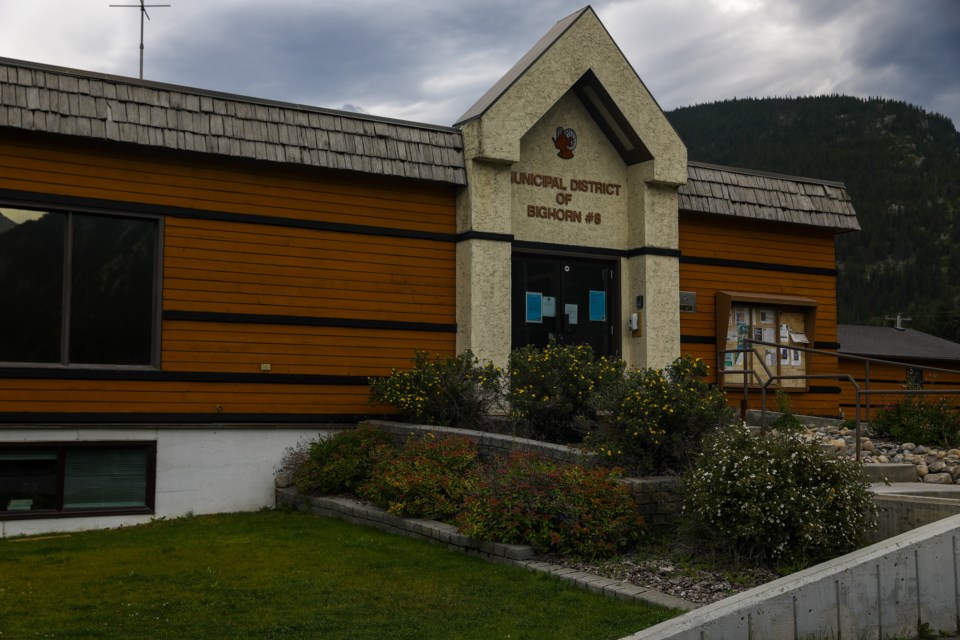MD OF BIGHORN – As the MD moves towards streamlining its land use bylaw, a public hearing heard from residents on an omnibus amendment proposal to provide clarity and streamline the development process for both municipal staff and applicants.
The 40 amendments up for potential approval, all of which primarily have to do with wording and definitions, include defining terms such as wet bar, quarry and peace officer, while replacing Alberta Building Code with the 2019 Alberta edition of the National Building Code.
Three of the five letters expressed concerns, but not outright opposition to the proposed changes, which includes change to development permits. Previously, after the two-year trial period was completed, development permits could be issued for up to five years. With the amendment, that is changed to 10 years, at the discretion of the development authority.
“There are three letters from individuals that talk about The Crossing,” Coun. Rick Tuza said.
The concern related to the issuing of a five-year permit, compared to a 10-year permit on the development located at Ghost River.
However, administration said in the hearing The Crossing passed its two-year term, and council passed a 10-year term for the development in July 2022.
“It is kind of a moot issue,” Tuza said.
Reeve Lisa Rosvold asked if the change to the 10-year term on the omnibus amendment bylaw was to get it in line with what was passed by council.
Administration said the development permit was done, but when it comes time to renew, if the bylaw wasn’t changed, then it would be a five-year term unless council granted a 10-year term.
Rosvold brought up a question related to the change requiring that visitor or resort accommodations keep a detailed guest register, including the name of the guests, the licence plate number of their vehicle, and their dates of occupancy. The bylaw states a centralized guest register system may be used.
Administration said some hotels don’t have a front desk and they have opted to do a digital centralized system. The information is kept on one system, rather than multiple systems.
“Is this just for resort accommodations,” asked Rosvold. “It sounds like it is for short-term rentals in people’s homes, as well as resort accommodations.”
Administration noted it is for resort and visitor accommodation, not visitor accommodation suites like Airbnb.
Shane Jonker, who owns land within the MD, spoke at the public hearing about his concerns related to the change.
“It is interesting to me that this is billed as a housekeeping amendment but there are significant implications from the changes being proposed,” Jonker said. “This is an example of if I had not been here today, I would have had a definition imposed on our property for which we have a development permit.”
One concern brought up by Jonker was the addition of a wet bar definition in the land use bylaw. The definition states a wet bar is a small bar for mixing and serving beverages that includes a sink with running water.
“When we add definitions to land use bylaws, they are meant to enable the municipality to restrict and regulate,” Jonker said. “How deep [does council] want to go into people’s homes when it comes to what they do inside these homes and where they get their food and beverages inside the home.”
Wet bars and kitchenettes would not be permitted within a dwelling that contains a bed and breakfast operation, according to the proposed changes.
“I think there are lots of calls for wet bars in people’s homes, which is defined as a counter and sink, so I would like council to consider carefully if this is where they want to go with regulating their communities,” Jonker said.
Dead Man’s Flats resident Lori Hogarth also spoke about her concerns on the requirement of short-term suites required to renew yearly, while bed and breakfast and secondary suites renew their permit every three years after the first year.
“Those with short-term visitor accommodation, we have to be the primary owner of the house. We have to live on the property,” Hogarth said. “We pay $400 every year for the permit, with the bed and breakfast, under the current land use bylaw, you don’t have to be the primary owner of the house. You can be the tenant.”
Hogarth added the length of the permit should be the same between bed and breakfasts and short-term visitor accommodations, while other aspects should differ.
“There shouldn’t be a difference between those two as far as the length of the permit is concerned,” Hogarth said. “They have to share their own home with the guest, whereas short-term it is a separate suite.”
Possibly amendments could now be made to the bylaw, and then it will go back to council for second and third readings.
A total of $18,000 has been allocated for the amendments. Since the amendments are being completed in-house, it is not expected the entire budget will be required.




